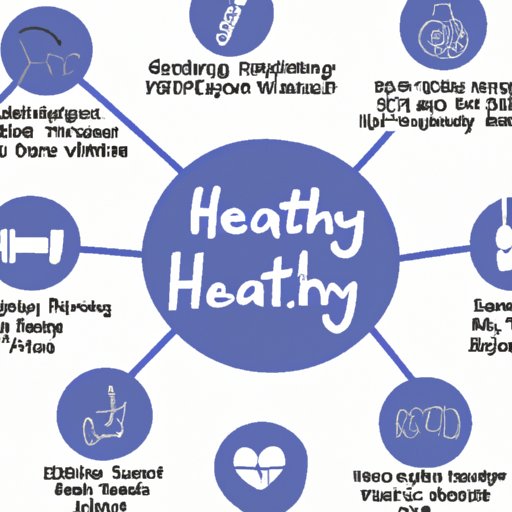Introduction
When people talk about being “healthy”, what do they mean? Generally speaking, being healthy is defined as having a state of complete physical, mental, and social well-being. However, there are many different dimensions of health that contribute to overall wellness. In this article, we will explore these different dimensions and how they are related to achieving optimal health.

Examining the Benefits of a Healthy Diet and Lifestyle
A healthy diet and lifestyle play an important role in maintaining good health. Eating nutritious foods and engaging in regular physical activity can help to reduce the risk of developing chronic diseases such as heart disease, diabetes, and cancer.
The Role of Nutrition in Optimal Health
Good nutrition is essential for optimal health. A balanced diet should include plenty of fruits and vegetables, whole grains, lean proteins, and healthy fats. Eating a variety of nutrient-dense foods helps to provide the body with the vitamins, minerals, and other nutrients it needs to function properly. According to the World Health Organization (WHO), “good nutrition is an important part of leading a healthy lifestyle. Combined with physical activity, your diet can help you to reach and maintain a healthy weight, reduce your risk of chronic diseases (like heart disease and cancer), and promote your overall health.”
Benefits of Eating Whole Foods
In addition to eating a variety of nutrient-dense foods, it is also important to focus on eating whole foods whenever possible. Whole foods are those that have been minimally processed and contain no added sugar, salt, or unhealthy fats. They are generally higher in fiber and other nutrients than their processed counterparts. Eating whole foods can help to improve digestion, reduce inflammation, and boost energy levels.
The Impact of Exercise on Physical Health
Regular physical activity is another important component of a healthy lifestyle. Regular exercise has many benefits, including improving cardiovascular health, strengthening bones and muscles, and reducing stress. According to the Centers for Disease Control and Prevention (CDC), adults should aim for at least 150 minutes of moderate-intensity aerobic activity per week and two days of muscle-strengthening activities. Additionally, it is recommended that children and adolescents get at least 60 minutes of physical activity each day.
Examining the Role of Stress in Mental and Physical Well-Being
Stress is a normal part of life, but it can have a negative impact on both mental and physical health if not managed properly. Understanding the connection between stress and health can help individuals learn how to better manage stress and maintain their wellbeing.
Understanding the Connection Between Stress and Mental Health
Stress can have a significant effect on mental health, contributing to the development of anxiety and depression. Studies have shown that individuals who experience high levels of stress are more likely to suffer from mental health issues. Additionally, stress can worsen existing mental health conditions, making it harder to cope with symptoms.
Managing Stress Through Healthy Habits
Fortunately, there are ways to manage stress and reduce its effects on mental health. Developing healthy habits such as getting enough sleep, exercising regularly, and practicing relaxation techniques can help to reduce stress levels. Additionally, taking time to engage in activities that bring joy can help to boost mood and promote positive mental health.
Exploring the Link Between Mental and Physical Health
It is important to remember that mental and physical health are closely intertwined. Mental health problems can lead to physical health issues, while physical health issues can have a negative effect on mental health. Thus, it is important to take care of both the mind and body in order to achieve optimal health.
The Relationship Between Mind and Body
Research has shown that there is a strong link between mental and physical health. For example, studies have found that people with depression are more likely to develop physical illnesses such as heart disease and diabetes. Additionally, chronic physical illnesses can increase the risk of developing depression and other mental health conditions.
How to Promote Positive Mental Health
There are many ways to promote positive mental health, such as staying connected with friends and family, engaging in enjoyable activities, and adopting healthy coping strategies. Additionally, seeking professional help when needed can be beneficial in managing mental health issues.

Learning How to Make Healthy Choices Every Day
Making healthy choices every day is an important part of maintaining good health. Adopting healthy habits such as eating nutritious foods, exercising regularly, and managing stress can help individuals achieve and maintain optimal health.
Adopting Healthy Habits
Developing healthy habits is key to achieving and maintaining optimal health. Establishing a regular routine can help individuals stick to healthy habits such as eating nutritious meals, getting adequate sleep, and exercising regularly. Additionally, breaking bad habits and replacing them with healthier ones can help to promote overall wellbeing.
Taking Time for Self-Care
Self-care is an important part of maintaining good health. Taking time to relax, unwind, and pursue activities that bring joy can help to reduce stress and boost mental health. Additionally, making time for self-care can help to prevent burnout and promote overall wellbeing.

Considering the Role of Genetics in Determining Health
Genetic factors can play an important role in determining health. Genetic predisposition to certain diseases can increase the risk of developing a particular condition. Additionally, environmental factors, such as exposure to toxins or infectious agents, can also influence health.
Genetic Predisposition to Certain Diseases
Genetic predisposition to certain diseases can increase the likelihood of developing a particular condition. For example, individuals who have a family history of heart disease may be at a higher risk of developing the condition themselves. Additionally, genetic variations can influence how individuals respond to certain medications or treatments.
The Influence of Environmental Factors on Health
Environmental factors, such as exposure to toxins or infectious agents, can also influence health. For example, living in an area with poor air quality can increase the risk of developing respiratory illnesses. Additionally, lifestyle factors, such as smoking and excessive alcohol consumption, can also have an adverse effect on health.
Conclusion
Overall, there are many different dimensions of health that contribute to overall wellbeing. Eating a nutritious diet, engaging in regular physical activity, managing stress, and taking time for self-care are all important components of achieving and maintaining optimal health. Additionally, genetic factors and environmental factors can also influence health. By taking a holistic approach to health, individuals can learn how to make healthy choices every day and achieve a state of complete physical, mental, and social wellbeing.
(Note: Is this article not meeting your expectations? Do you have knowledge or insights to share? Unlock new opportunities and expand your reach by joining our authors team. Click Registration to join us and share your expertise with our readers.)
